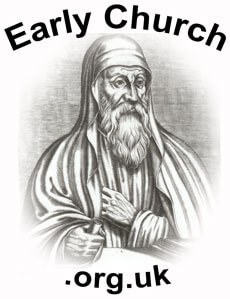Synopsis
EBIONITES. This designation was at first, like
"Nazarenes," a common name for all Christians, as Epiphanius (d. 403) testifies
(Adv. Haer., xxix. 1). It is derived from the Hebrew [Hebrew text
omitted] "poor," and was not given, as Origen supposes, in reference to their
low views of Christ, but to their own poverty. This poverty, especially
characteristic of the Christians of Jerusalem, evoked from the Pagan and Jewish
world the contemptuous appellation of "the poor." Minutius Felix says, "That we
are called the poor is not our disgrace, but our glory" (Octav., 36).
Subsequently its application was limited to Jewish Christians. "The Jews who
accept Christ are called Ebionites," writes Origen (c. Cels., II. 1).
Then, when a portion of the Jewish Church became separate and heretical, the
designation was used exclusively of it. Later in the fourth century Epiphanius,
Jerome, and others use it of a separate party within the Jewish Church distinct
from the Nazarenes. This outline of history proves that Tertullian was wrong
when he derived the term from a pretended founder of the sect called Ebion.
The notices in the early fathers are fragmentary, and at
times seem to be contradictory on account of the double application of the
term, now to Jewish Christianity as a whole, now only to a party within it. The
New Testament knows of no sects in the Jewish Church, but indicates the
existence of different tendencies. At the Council of Jerusalem a legalistic and
Judaizing spirit manifested itself, which was in antagonism to the spirit of
Paul, and was shown in the Judaiziug teachings which did so much mischief in
the Galatian churches. But it was not until after the destruction of Jerusalem,
and the founding of Aelia Capitolina by Hadrian, in 134, that Jewish
Christianity became a distinct school, gradually becoming more and more
heretical till it separated into the two sects of Ebionites proper and
Nazarenes. The latter still held to Paul as an apostle, and, while they kept
the law themselves, did not demand its observance of the Gentile Christians.
The former held the observance of the law to be obligatory upon all Christians
alike, and rejected Paul as an apostate. This was the state of affairs at the
time of Justin Martyr (Dial. c. Tryph., 47). Irenaeus, who does not
mention this party division, describes the Ebionites as stubbornly clinging to
the law, as rejecting the apostle Paul as an apostate, and all the Gospels
except Matthew. He further notices a christological heresy. Denying Christ's
birth from the Virgin, they regarded him as a mere man. Origen (c.
Cels., V. 61) distinguishes between two branches of Ebionites, - those who
denied and those who accepted the miraculous birth. Here he distinction between
Nazarenes and the Ebionites proper becomes apparent. In the later fathers, as
Jerome, Epiphanius, etc., the notices are more frequent; but nothing is added
to our knowledge except that the [p.685] Ebionites were chiliasts (Jerome
ad. Esdr., 35, 1). In Epiphanius' day (d. 403) they dwelt principally in
the regions along the Dead Sea, but also in Rome and Cyprus. The disintegration
of Jewish Christianity was consummated by the introduction of Gnostic
philosophy, of Greek culture, as also, perhaps, of Oriental theosophy. See the
art. ELKESAITES.
G. Uhlhorn, "EBIONITES," Philip Schaff, ed., A Religious Encyclopaedia or Dictionary of Biblical, Historical, Doctrinal,
and Practical Theology, 3rd edn., Vol. 2. Toronto, New York & London:
Funk & Wagnalls Company, 1894. pp.684-685.

 |
Epiphanius, Panarion 29-30. |
 |
Eusebius, Church History 3.27. |
 |
Hippolytus, Refutation of All
Heresies 7.22, 34; 9.13-17. |
 |
Irenaeus, Against Heresies 1.26.2, 3.11.7; 3.21.1, 5.1.3. |
 |
Justin Martyr, Dialog With
Trypho 47. |
 |
Origen, Against Celsus 2.1. |
 |
Pseudo-Tertullian, Against All
Heresies 11. |
 |
Tertullian, Prescription Against
Heretics 33. |

 |
Ebionites (Catholic Encyclopedia) |
 |
F.J.A. Hort, Judaistic
Christianity. Cambridge & London: MacMillan, 1894. |
 |
L.E. Keck, "The Poor Amongst the Saints
in the New Testament," Zeitschrift für die neutestamentliche
Wissenschaft 56 (1965): 100-129. |
 |
L.E. Keck, "The Poor Amongst the Saints
in Jewish Christianity and Qumran," Zeitschrift für die
neutestamentliche Wissenschaft 57 (1966): 54-78. |
 |
Albertus Frederik Johannes Klijn &
G.J. Reinink, Patristic evidence for Jewish-Christian sects. Supplements
to Novum Testamentum 36. Leiden: Brill, 1973. Hbk. ISBN: 9004037632.
pp.313. |
 |
H.J. Schoeps, "Ebionite
Christianity," Journal of Theological Studies 16 (1955):
219-24. |
 |
G. Strecker, "On the Problem of Jewish
Christianity," R.A. Kraft & G. Krodel, eds. Orthodoxy and Heresy in
Early Christianity. Philadelphia: Fortress Press, 1971.
pp.241-285. |
 |
Edward J. Young, "Biblical Criticism in the Second Century" (Pd.D. diss., The Dropsie College for Hebrew and Cognate Learning, 1943). pdf [Reproduced by permission of the current copyright holder] pdf [Reproduced by permission of the current copyright holder] |
Related Subjects











